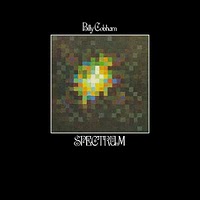 I might be one of the few people who ventured into this album as a Deep Purple fan more than anything else. I’d read that Tommy Bolin’s best work could be found on this album so I wanted to see what all the fuss was about. Since then I’ve found out some more about Mr. Cobham and from “Spectrum” alone, I’m impressed. The band sound really tight on this album and every track bursts with energy. The first track is an absolute mad dash to the end with great soloing and frenetic drumming, but my favorite tracks are “Stratus” and “Red Baron”. Both of these songs have really cool, laid back grooves and the interplay between guitar, keyboard and drums is delightful. After entering into “Spectrum” as a Tommy Bolin fan, I left as a Jan Hammer fan. The keyboard solo’s here are breath-taking, stealing focus from Bolin who is no slouch himself. –Tom
I might be one of the few people who ventured into this album as a Deep Purple fan more than anything else. I’d read that Tommy Bolin’s best work could be found on this album so I wanted to see what all the fuss was about. Since then I’ve found out some more about Mr. Cobham and from “Spectrum” alone, I’m impressed. The band sound really tight on this album and every track bursts with energy. The first track is an absolute mad dash to the end with great soloing and frenetic drumming, but my favorite tracks are “Stratus” and “Red Baron”. Both of these songs have really cool, laid back grooves and the interplay between guitar, keyboard and drums is delightful. After entering into “Spectrum” as a Tommy Bolin fan, I left as a Jan Hammer fan. The keyboard solo’s here are breath-taking, stealing focus from Bolin who is no slouch himself. –Tom
Album Reviews
Miles Davis “Water Babies” (1976)
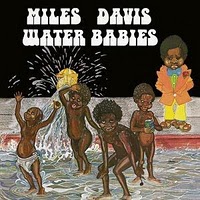 For an album of leftover tracks from the Quintet’s late 60s sessions, this is surprisingly cohesive. Saxophonist Wayne Shorter pens all these tracks and “Two Faced” is the best of the bunch, a stunning, mind melting improvisation featuring Chick Corea providing ethereal washes of electric piano. That track alone is worth getting this album. “Water Babies” and “Sweat Pea” sound radically rearranged from the versions available on Shorter’s solo albums. The former sounds extended and has more percussive elements, the latter transformed into a lovely ballad rather, than the short piece found on Super Nova. –Neal
For an album of leftover tracks from the Quintet’s late 60s sessions, this is surprisingly cohesive. Saxophonist Wayne Shorter pens all these tracks and “Two Faced” is the best of the bunch, a stunning, mind melting improvisation featuring Chick Corea providing ethereal washes of electric piano. That track alone is worth getting this album. “Water Babies” and “Sweat Pea” sound radically rearranged from the versions available on Shorter’s solo albums. The former sounds extended and has more percussive elements, the latter transformed into a lovely ballad rather, than the short piece found on Super Nova. –Neal
Traffic “Mr. Fantasy” (1967)
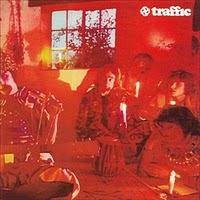 I don’t know whose idea it was to have Steve Winwood start wearing those big shouldered blazers back in the 80s, but that person should be beaten, or maybe put in the stocks medieval style. If Steve himself made this decision, well, I can only put my head in my hands and sigh. I hated his yuppie pop period in the 80s, but this was before I discovered Traffic and the Spencer Davis Group, two bands which definitely changed my view of him considerably. There are so many different versions of this album, but I think I’m covered because I have the reissue which includes the Heaven Is In Your Mind version, which is kind of the same thing, but was only released in the US. Anyway, I like the uniqueness of their sound and the fact they weren’t just another generic hippie dippy psych band. Great nods to jazz and world music, plus interesting uses of flute and sitar. I guess the jazz influence would grow more prominent on subsequent albums. “Dealer” could just be my all time favourite Traffic song with its Spanish style guitar. Just Beautiful. –Neal
I don’t know whose idea it was to have Steve Winwood start wearing those big shouldered blazers back in the 80s, but that person should be beaten, or maybe put in the stocks medieval style. If Steve himself made this decision, well, I can only put my head in my hands and sigh. I hated his yuppie pop period in the 80s, but this was before I discovered Traffic and the Spencer Davis Group, two bands which definitely changed my view of him considerably. There are so many different versions of this album, but I think I’m covered because I have the reissue which includes the Heaven Is In Your Mind version, which is kind of the same thing, but was only released in the US. Anyway, I like the uniqueness of their sound and the fact they weren’t just another generic hippie dippy psych band. Great nods to jazz and world music, plus interesting uses of flute and sitar. I guess the jazz influence would grow more prominent on subsequent albums. “Dealer” could just be my all time favourite Traffic song with its Spanish style guitar. Just Beautiful. –Neal
The Magnetic Fields “69 Love Songs” (1999)
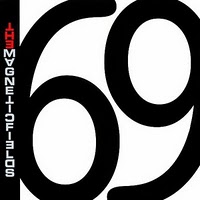 Before I bought this three disc set, I had downloaded some tracks from the collection and included them on various playlists. As a result, I had different favorites over time, falling in love with various tracks as they embedded themselves into my psyche. When I finally heard all the songs together I was blown away at the uniqueness of all these tracks. There’s a lot here that works well together – simple instrumentation (some acoustic, some electro), alternating vocalists, dry humour, classic pop songwriting – Merritt is definitely one of the stellar songwriting voices of his generation. There’s just the right amount of cheese here too, not too much but just enough to at least deflate things when they become too serious. Some favourites include “When My Boy Walks Down The Street”, “Reno Dakota”, “Washington DC” and “Zebra”. Merritt should really turn these songs into some sort of musical because love is well..universal, and rightfully should be celebrated with song and dance. We see the theme of love here revealed, warts and all, with all its betrayals, bliss, rejection, infatuation, etc. This certainly isn’t Julio Iglesias territory, although it would be nice to hear the famous Latin Lover croon his way through “How Fucking Romantic.” –Neal
Before I bought this three disc set, I had downloaded some tracks from the collection and included them on various playlists. As a result, I had different favorites over time, falling in love with various tracks as they embedded themselves into my psyche. When I finally heard all the songs together I was blown away at the uniqueness of all these tracks. There’s a lot here that works well together – simple instrumentation (some acoustic, some electro), alternating vocalists, dry humour, classic pop songwriting – Merritt is definitely one of the stellar songwriting voices of his generation. There’s just the right amount of cheese here too, not too much but just enough to at least deflate things when they become too serious. Some favourites include “When My Boy Walks Down The Street”, “Reno Dakota”, “Washington DC” and “Zebra”. Merritt should really turn these songs into some sort of musical because love is well..universal, and rightfully should be celebrated with song and dance. We see the theme of love here revealed, warts and all, with all its betrayals, bliss, rejection, infatuation, etc. This certainly isn’t Julio Iglesias territory, although it would be nice to hear the famous Latin Lover croon his way through “How Fucking Romantic.” –Neal
John Coltrane “My Favorite Things” (1961)
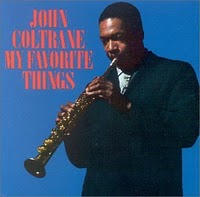 If ever there was a document to the genius of Trane it is the title track here. He takes a perky little Rogers and Hammerstein number and infuses it with Indian influences and extends it to thirteen of the most intense minutes of listening pleasure ever. No wonder it become Trane’s most requested and loved piece. This album features three other standards given the Trane treatment but lets be honest My Favorite Things is the highlight. The LP also introduces us to the Soprano sax that Trane so favored at times. A hard instrument to love unless in the right hands he plays it with his usual ferocity and vigor and makes it sing and cry like no else has ever done. Also, listen to the work of McCoy Tyner on the title track. Has he ever sounded better. His work on this track makes the hairs on the back of my neck stand up every time I hear it. –Jon
If ever there was a document to the genius of Trane it is the title track here. He takes a perky little Rogers and Hammerstein number and infuses it with Indian influences and extends it to thirteen of the most intense minutes of listening pleasure ever. No wonder it become Trane’s most requested and loved piece. This album features three other standards given the Trane treatment but lets be honest My Favorite Things is the highlight. The LP also introduces us to the Soprano sax that Trane so favored at times. A hard instrument to love unless in the right hands he plays it with his usual ferocity and vigor and makes it sing and cry like no else has ever done. Also, listen to the work of McCoy Tyner on the title track. Has he ever sounded better. His work on this track makes the hairs on the back of my neck stand up every time I hear it. –Jon
Van Halen “Van Halen” (1978)
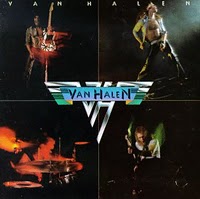 Born from the clubs of LA’s Sunset Strip, Van Halen is a manifesto of life lived in the extreme – hot nights in pursuit of booze and babes, all else be damned. An album that embodies rock’s basic love of wild, party-hearty recklessness with a shot of danger, Van Halen’s personality lives and breathes it’s two frontmen, as over a rock solid rhythmic foundation laid down by Michael Anthony and Alex Van Halen, Eddie dances on a six-string, nickel plated tightrope, while Diamond Dave gives his best peacock impression throughout the classic disc. Decades later, Eddie’s seemingly second-nature abilities still astonish, while Roth is from a land that time forgot, possessing a sense of showmanship and confidence that simply wouldn’t make it past today’s thought police. Van Halen’s timelessness is insured by this cocksure combo of intoxicated revelry and overflowing talent. A solid half of Van Halen has become ubiquitous: “Ain’t Talkin’ About Love,” the steamy “Runnin’ With the Devil,” hard rock candy of “Jamie’s Cryin’,” prowling “Feel Your Love Tonight,” and the smirking cover of The Kinks’ “You Really Got Me.” But the rest of the disc is just as stellar, featuring the blazing “On Fire,” high voltage aggression of “Atomic Punk” and “I’m the One,” jokey blues strutter “Ice Cream Man,” and the blurry-eyed “Little Dreamer.” And one can’t forget “Eruption,” a two minute, tossed-off guitar stunt suited perfectly to this album’s blaring braggadocio. Ted Templeman’s production breathes with a sweaty, live energy, and with it’s bulletproof lineup, Van Halen rolls down the boulevard crusin’ for action, it’s wares on full display, ready to take on all comers. –Ben
Born from the clubs of LA’s Sunset Strip, Van Halen is a manifesto of life lived in the extreme – hot nights in pursuit of booze and babes, all else be damned. An album that embodies rock’s basic love of wild, party-hearty recklessness with a shot of danger, Van Halen’s personality lives and breathes it’s two frontmen, as over a rock solid rhythmic foundation laid down by Michael Anthony and Alex Van Halen, Eddie dances on a six-string, nickel plated tightrope, while Diamond Dave gives his best peacock impression throughout the classic disc. Decades later, Eddie’s seemingly second-nature abilities still astonish, while Roth is from a land that time forgot, possessing a sense of showmanship and confidence that simply wouldn’t make it past today’s thought police. Van Halen’s timelessness is insured by this cocksure combo of intoxicated revelry and overflowing talent. A solid half of Van Halen has become ubiquitous: “Ain’t Talkin’ About Love,” the steamy “Runnin’ With the Devil,” hard rock candy of “Jamie’s Cryin’,” prowling “Feel Your Love Tonight,” and the smirking cover of The Kinks’ “You Really Got Me.” But the rest of the disc is just as stellar, featuring the blazing “On Fire,” high voltage aggression of “Atomic Punk” and “I’m the One,” jokey blues strutter “Ice Cream Man,” and the blurry-eyed “Little Dreamer.” And one can’t forget “Eruption,” a two minute, tossed-off guitar stunt suited perfectly to this album’s blaring braggadocio. Ted Templeman’s production breathes with a sweaty, live energy, and with it’s bulletproof lineup, Van Halen rolls down the boulevard crusin’ for action, it’s wares on full display, ready to take on all comers. –Ben
The Smiths “The Smiths” (1984)
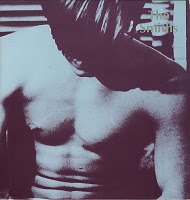 If Smiths fans had a propensity for violence, I would’ve been beaten up quite a bit in middle school. You see, I was eleven and quite liked Bon Jovi – might as well get that skeleton out of the closet now. The most I got from the older Smiths fans at school (and ooh they ever were soo cool) were dirty looks or eye rolls. Well, whatever…I don’t like Bon Jovi anymore (don’t hate ’em either, they seem like nice chaps), and do consider myself a Smiths fan, but it wasn’t really anything to do with my school experiences. Enter Morrissey and Marr. The latter’s distinct guitar style is what blew me away first. He comes across as a kind of post punk Roger McGuinn. I guess I realized that one didn’t have to be a “shredder” like Eddie Van Halen to stand out as a good guitarist. Then the Moz…well, not many have managed to duplicate that croon of his have they? I remember the Smoking Popes didn’t sound anything like the Smiths, but their singer had the dry tuneless croon down pat. I find the Moz’s singing on this debut strangely attractive, even funny – especially on “Miserable Lie” on which he eventually gives up singing altogether and just kind of hoots. But everything here is instantly memorable, especially the smash hits on the latter half of the album. –Neal
If Smiths fans had a propensity for violence, I would’ve been beaten up quite a bit in middle school. You see, I was eleven and quite liked Bon Jovi – might as well get that skeleton out of the closet now. The most I got from the older Smiths fans at school (and ooh they ever were soo cool) were dirty looks or eye rolls. Well, whatever…I don’t like Bon Jovi anymore (don’t hate ’em either, they seem like nice chaps), and do consider myself a Smiths fan, but it wasn’t really anything to do with my school experiences. Enter Morrissey and Marr. The latter’s distinct guitar style is what blew me away first. He comes across as a kind of post punk Roger McGuinn. I guess I realized that one didn’t have to be a “shredder” like Eddie Van Halen to stand out as a good guitarist. Then the Moz…well, not many have managed to duplicate that croon of his have they? I remember the Smoking Popes didn’t sound anything like the Smiths, but their singer had the dry tuneless croon down pat. I find the Moz’s singing on this debut strangely attractive, even funny – especially on “Miserable Lie” on which he eventually gives up singing altogether and just kind of hoots. But everything here is instantly memorable, especially the smash hits on the latter half of the album. –Neal
Richard Thompson “Henry the Human Fly” (1972)
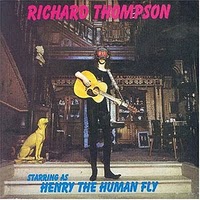 Richard Thompson’s solo debut is, not surprisingly, the one where the chilly folk rock wind of his former band blows most freely, a creaky, moldy affair that matches his stuffy-nosed vocals to a set of weary and ominous songs. The traditional, old world atmosphere of Henry perfectly suits tracks like the fearsome “Roll Over Vaughn Williams,” sorrowful folk ballad “The Poor Ditching Boy,” and drunken “Twisted,” yet also limits the immediate appeal of the album. Elsewhere there’s “The Old Changing Way,” a simple and affecting tale of fragmented brotherhood, while the clouds briefly part with the arrival of Sandy Denny and Linda Peter’s (soon Linda Thompson) vocals on the virtually upbeat “The Angels Took My Racehorse Away,” never mind it’s sentiment of loss. While it’s hard to recommend the soggy sounds of Henry to those who’ve yet to be converted to the doom and gloom of Thompson’s world, it’s also not hard to see why, with it’s distilled purity, it’s become an unlikely favorite. –Ben
Richard Thompson’s solo debut is, not surprisingly, the one where the chilly folk rock wind of his former band blows most freely, a creaky, moldy affair that matches his stuffy-nosed vocals to a set of weary and ominous songs. The traditional, old world atmosphere of Henry perfectly suits tracks like the fearsome “Roll Over Vaughn Williams,” sorrowful folk ballad “The Poor Ditching Boy,” and drunken “Twisted,” yet also limits the immediate appeal of the album. Elsewhere there’s “The Old Changing Way,” a simple and affecting tale of fragmented brotherhood, while the clouds briefly part with the arrival of Sandy Denny and Linda Peter’s (soon Linda Thompson) vocals on the virtually upbeat “The Angels Took My Racehorse Away,” never mind it’s sentiment of loss. While it’s hard to recommend the soggy sounds of Henry to those who’ve yet to be converted to the doom and gloom of Thompson’s world, it’s also not hard to see why, with it’s distilled purity, it’s become an unlikely favorite. –Ben
Metallica “Ride the Lightning” (1984)
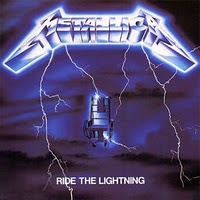 Like everyone else my age, The Black Album was the introduction into metal and the undeniable force known as, Metallica. So, obviously I had to do a bit of working backwards to familiarize myself with their other (heavier) albums. I came to enjoy all of their 80’s material, but Ride the Lightning struck me the hardest with its tremendous sound that was brought to the forefront by James Hetfield’s growling voice, Lars Ulrich’s powerful drumming, Kirk Hammett’s severely commanding guitar playing, and Cliff Burton’s intense bass. Each member proved to be pivotal to the genius sound they created on this record and while, Master of Puppets usually gets all the accolades for being their finest, I still come back to this one much more and truly feel that it’s by far the greatest thrash metal album of all-time. –Jason
Like everyone else my age, The Black Album was the introduction into metal and the undeniable force known as, Metallica. So, obviously I had to do a bit of working backwards to familiarize myself with their other (heavier) albums. I came to enjoy all of their 80’s material, but Ride the Lightning struck me the hardest with its tremendous sound that was brought to the forefront by James Hetfield’s growling voice, Lars Ulrich’s powerful drumming, Kirk Hammett’s severely commanding guitar playing, and Cliff Burton’s intense bass. Each member proved to be pivotal to the genius sound they created on this record and while, Master of Puppets usually gets all the accolades for being their finest, I still come back to this one much more and truly feel that it’s by far the greatest thrash metal album of all-time. –Jason
Thin Lizzy “Jailbreak” (1976)
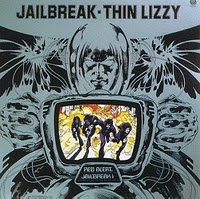 Containing the only two Thin Lizzy tracks you’re ever likely to hear on the restricted playlists of classic rock radio in the US, with the barroom nostalgia of “The Boys Are Back in Town” and tight-fisted title track, Jailbreak has become the most recognized release of the band’s existence. In many ways, the album simply carries on from Fighting in it’s mix of classic Lizzy rockers featuring generous amounts of their signature dual guitar sound, and an abundance of mellower songs highlighting Lynott’s penchant for romantic lyricism. The heavier tracks are some of the band’s best yet, with the bold “Warriors” and battlefield tale “Emerald,” but the band turns in some stellar easygoing entries like the wistful “Cowboy Song,” catchy “Running Back,” and broken-hearted “Romeo and the Lonely Girl.” Throughout, Lynott’s expressive vocals and the band’s high-caliber musicianship add an earnestness to the material, without sacrificing the power at the band’s core. –Ben
Containing the only two Thin Lizzy tracks you’re ever likely to hear on the restricted playlists of classic rock radio in the US, with the barroom nostalgia of “The Boys Are Back in Town” and tight-fisted title track, Jailbreak has become the most recognized release of the band’s existence. In many ways, the album simply carries on from Fighting in it’s mix of classic Lizzy rockers featuring generous amounts of their signature dual guitar sound, and an abundance of mellower songs highlighting Lynott’s penchant for romantic lyricism. The heavier tracks are some of the band’s best yet, with the bold “Warriors” and battlefield tale “Emerald,” but the band turns in some stellar easygoing entries like the wistful “Cowboy Song,” catchy “Running Back,” and broken-hearted “Romeo and the Lonely Girl.” Throughout, Lynott’s expressive vocals and the band’s high-caliber musicianship add an earnestness to the material, without sacrificing the power at the band’s core. –Ben
Roxy Music “Roxy Music” (1972)

An insane record that sounds at times like rock ‘n’ roll risen from the dead (the original post-rock?): Bryan Ferry’s a vampire in too-tight tuxedo, drunk out of his mind on champagne at a cocktail party and desperately declaring how he used to be a star (a unique and paradoxical property for a frontman’s debut); Brian Eno’s synths spread gloomy atmospherics like a fog machine, his keys stab clumsily like a Jerry Lee Lewis rebuilt by Frankenstein; Andy Mackay spit-shines the rough edges with creepy Teutonic reeds and squealing brass; Paul Thompson galumphs along like a Stax stable studio drummer kept alive by amphetamines; and Phil Manzanera’s overdriven six-string heroics harness noise like White Light/White Heat era Lou Reed with years of lessons.
This is in many ways the quintessential Roxy album (although I’d be tempted to say the same about the next three). Their sly, subversive pop is at its most unhinged here, at its riskiest and most outrageous, making few concessions to commercialism and with a self-aware artiness and goofiness that contrasts rather sharply with Ferry’s later shameless self-promotion as refined European Romantic (a self-stylization that would eventually get the best of him). By no means is it their best album—their ambitions exceed their abilities in a few places, and the suave, smarmy refinements of For Your Pleasure now seem conspicuously absent—and I agree with most reviewers who suggest it’s rather top-heavy—but it’s a milestone of 70s rock, nonetheless; an important template for much that followed; and thus arguably the group’s most important. –Will
Circuit Rider “Circuit Rider” (1980)
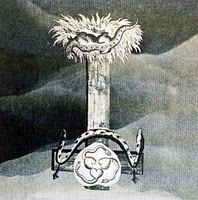 This private press pot of insanity from 1980 literally sounds like hell’s angels covering L.A. Woman. There’s no record label, the catalog number is 666, and it was maybe recorded in the early seventies, but no one really knows. Where did this come from? Connecticut actually, but it sounds a lot more like a deep swamp field recording. A lot of music sounds druggy, this one seems to top it all. The density of the haze within the grooves is thick enough to make you want to take a shower. At times it sounds like Funkadelic with no drums, at others it touches on more of a Canned Heat aesthetic, but always laced with heavy doses of lucid blanketing. The singer has some sort of biker/shaman/howling dog formula that, besides making the lizard king sound like Tom Jones in comparison, doesn’t bore the listener with cheesy trippy organ either. In fact the listener is way too frightened to be bored. It basically sounds like what you think of the sixties in your head, even when most actual sixties music sounds like the soundtrack to pictures of somebody’s goofy dad wearing bellbottoms. –Alex
This private press pot of insanity from 1980 literally sounds like hell’s angels covering L.A. Woman. There’s no record label, the catalog number is 666, and it was maybe recorded in the early seventies, but no one really knows. Where did this come from? Connecticut actually, but it sounds a lot more like a deep swamp field recording. A lot of music sounds druggy, this one seems to top it all. The density of the haze within the grooves is thick enough to make you want to take a shower. At times it sounds like Funkadelic with no drums, at others it touches on more of a Canned Heat aesthetic, but always laced with heavy doses of lucid blanketing. The singer has some sort of biker/shaman/howling dog formula that, besides making the lizard king sound like Tom Jones in comparison, doesn’t bore the listener with cheesy trippy organ either. In fact the listener is way too frightened to be bored. It basically sounds like what you think of the sixties in your head, even when most actual sixties music sounds like the soundtrack to pictures of somebody’s goofy dad wearing bellbottoms. –Alex


